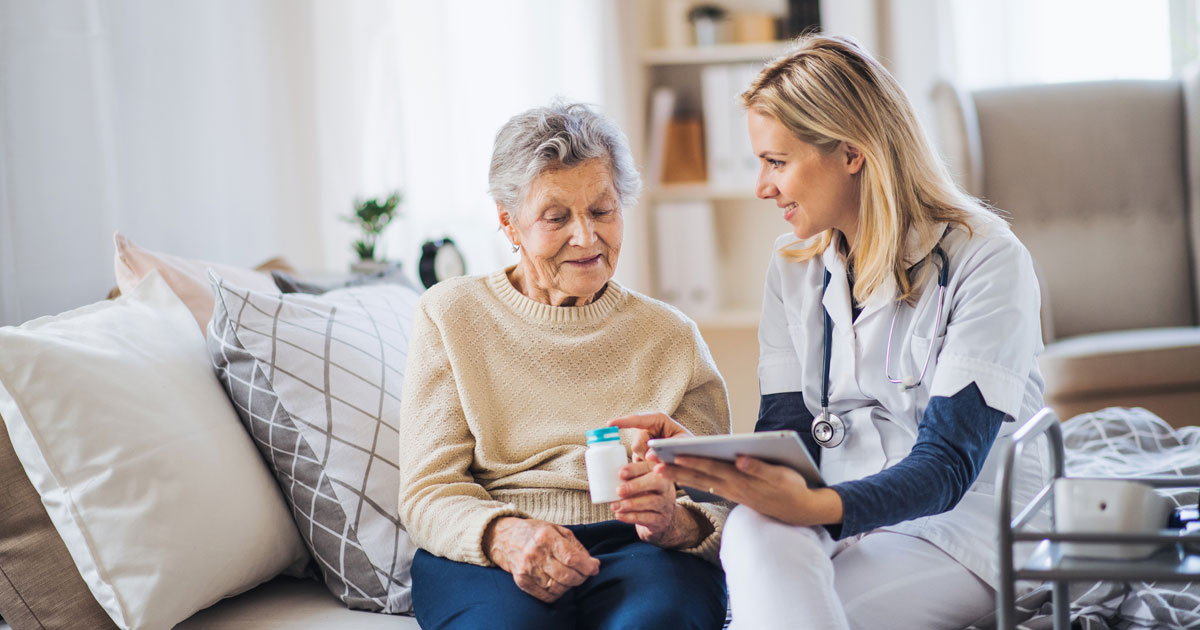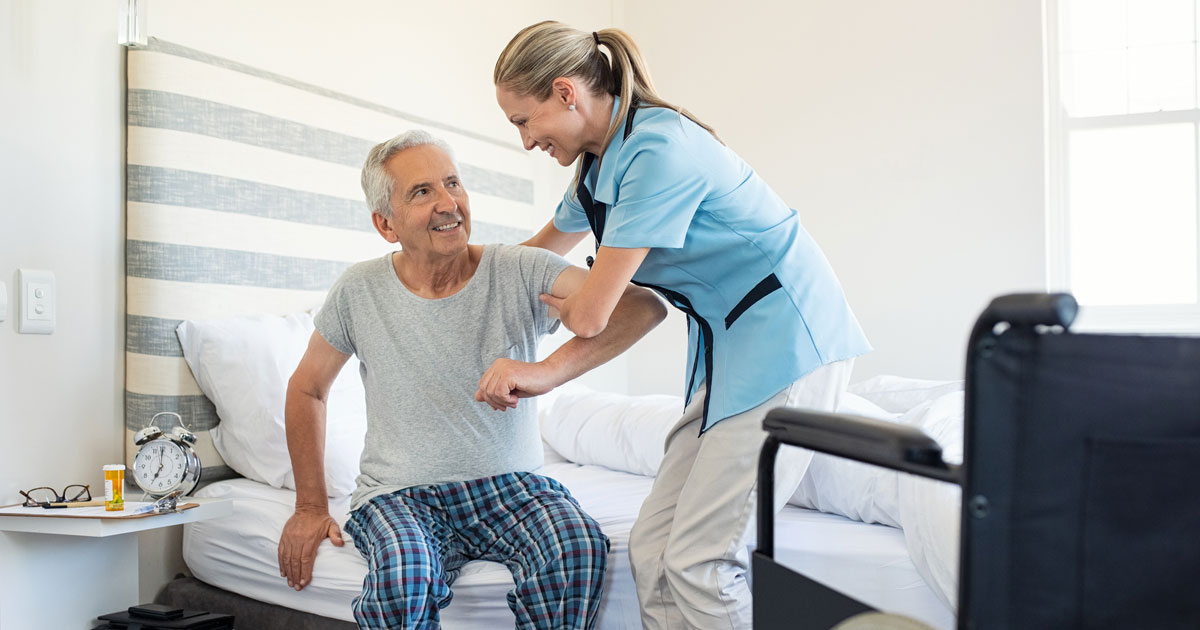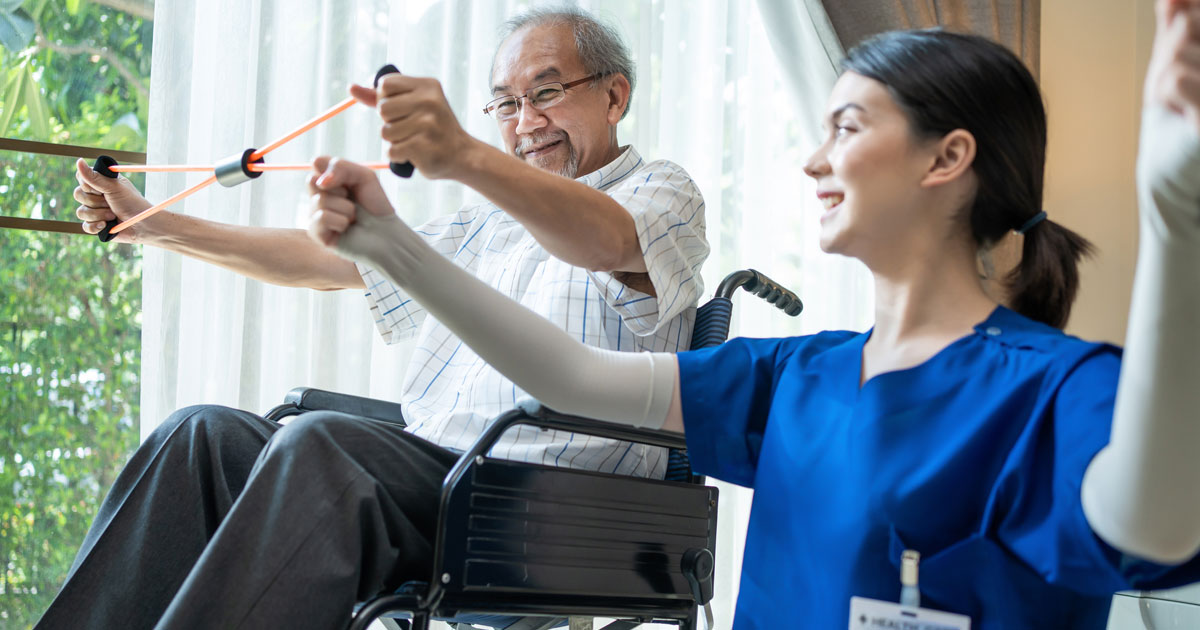
As many older adults age into a period of their lives in which they require assistance with daily living and are unable to leave the house alone, family members and caregivers begin to think about acquiring help in providing care. While many family members consider performing this care themselves, oftentimes they quickly learn that they do not have all of the skills and knowledge required to properly care for seniors.
At this point, families start to think about their options, weighing between sending their older adult family member to a nursing home, or to arrange for home based primary care. For those who wish to arrange home health care for homebound older adults, there are many benefits, and a great deal to consider.
The Need for Home-Based Primary Care
Live-in nursing facilities have historically been the more common choice for Americans when it comes to finding care for senior family members. More recently, this standard expectation has begun to shift. While the population of senior citizens is currently growing larger and larger, nursing homes do not always have the availability to take the many new potential patients.
With the older adult homebound population in the United States at around 2 million people, more home care is needed than ever. Aside from the issue of open spaces themselves, home medical care can also be significantly less expensive per month when compared to round-the-clock assisted living facilities. Not only that but being able to receive care in the comfort of a familiar environment is desirable for many frail older adults.
Families each have to deal with this in their own way, but it is clear that a general rethinking is needed when it comes to providing proper care for homebound adults. Many homebound older adults are socially isolated, economically disadvantaged, and are more likely to suffer from depressive symptoms and dementia.
This massive homebound population is also associated with an incredibly high mortality rate. A study in the Journal of the American Geriatrics Society found that within a six-year period of observation, 65% of the seniors in the study had died.
Criteria to be Considered "Homebound"
While home medical care is not restricted to those considered to be homebound adults, in most cases the costs will not be reimbursed by Medicare unless the patient meets the criteria for homebound status. The term "homebound" generally covers any patient who has a condition which hinders or prevents them from being able to leave home alone and without assistance.
In this case, assistance refers to any help that is required from a home health aide or nurse, canes, crutches, wheelchairs, or other such assistive devices. Homebound older adults may still leave home for things such as medical care or mental health services that cannot be provided at home, without losing their homebound status. Homebound older adults most often are also allowed to leave home for special events such as going to church or birthday celebrations.

Issues Faced by Homebound Adults
Homebound status is fairly common among older adults in the United States. In addition to the 2 million adults over 65 who are completely homebound, there are an additional 5.5. million people who are considered partially homebound (i.e., have difficulty leaving or need help to leave home).
This large population, as mentioned previously, is more vulnerable than most others. They have many care needs which can often be very expensive in the long term. Statistically, frail and homebound older adults are more likely to be from a minority group, be single, lack higher education, and be from a low-income group.
Being far more isolated than other adults, those who are homebound are more likely to suffer from undiagnosed mental illness such as depression, dementia, and Alzheimer's disease. Homebound patients are also less likely to report negative physical and mental health symptoms, making it more difficult to provide preventive care.
This is not to even mention the devastating mortality rate, which has been found to be higher than that of active cancer patients according to a study of Kaiser Permanente Northern California members.
This population of frail and homebound older adults also tends to be among the least visible to health care systems, and lack access to traditional primary care and mental health services. Due to this lack of visibility, frail geriatric adults are less likely to receive basic preventive care, and wind up having higher hospital costs to deal with issues that would otherwise have been preventable.
A 2017 study in the Annals of Internal Medicine found that an estimated 50% of overall preventable Medicare costs are due to claims for frail older adults, most of which are the result of preventable hospitalizations. As such, adequate home health care is a needed primary care model.
Benefits of In-Home Care
While there can be many difficulties in providing necessary and adequate home care for high-risk older adults, there are many benefits to in-home care when compared to long term care facilities. These benefits can include additional comfort and convenience, decreased health care costs, and improved physical and mental health for patients.
In-home personal care allows patients to feel familiar and, well, at home. Patients and their family can feel confident that they have real control over their care and their surroundings. For older adults especially, having to adjust to nursing homes can be excruciating. Learning their way around new surroundings, having to deal with strangers, and suddenly having less of a say over their comings-and-goings is a difficult change to face.
While by no means easy, providing home based primary care and mental health services takes so much of the stress out of the process, for both the patient and their family. The pressure to go back and forth from appointments on time, to deal with front desks and visitation hours, all of that is removed from the process.
The patient's preferences can be met far more easily with far less need to compromise, as they have more direct say over their surroundings. This increased sense of independence can make a huge difference in how frail older adults feel day-to-day.
When thinking about therapeutic homebound adult services, home based care can also make the process easier. Rather than being distracted or disturbed by other patients waiting for care, or even feeling as though the patients are being rushed, in-home services provide far more direct attention and personal care. At home care can also often be less expensive than a hospital visit would be.
One of the greatest benefits of home health care is social involvement. Being at home, it is far easier for family members and friends to support the older adult in their life and drive them to recovery, when possible. Members of the patient's social group can participate in or attend physical therapy sessions to encourage and push the patient, as well as motivate them to maintain and reach goals.
Home health care ultimately helps patients to recover more quickly from injury or illness, and helps them to regain confidence in managing their symptoms over time. Even if additional care is needed, regaining some level of self-sufficiency can make patients feel far more comfortable and independent.
With all of this in mind, home health care may not always be suitable for older adults in need of more advanced health care services. If your loved one requires specialized care or equipment for multiple chronic conditions, it may be unsafe or ultimately impossible to provide care outside of a healthcare facility. This can also be true of patients dealing with serious mental illness that requires round-the-clock supervision.

Services Available for Homebound Adults
While being homebound comes with many difficulties for older adults and their families, there are many social services that can be given to meet patient needs depending on local service providers. These services can provide social interaction, improve access to health care, and overall improve the quality of life for the patient population. Some of the services that can be helpful to homebound older adults are as follows:
Daily Life
Whether short- or long-term services are required, many frail older adults need assistance in providing for their daily needs. Services are available to aid in all of these aspects, depending on the individual needs of the patient. Aides or social workers can help patients to rise from bed in the morning, as well as generally assisting in getting around. Dressing, hygiene, grooming, and using the restroom are also things for which many older adults need assistive services.
In addition to meeting these more personal needs, services are also available for housekeeping, transportation, shopping for groceries, and even things such as preparing meals in advance. These services are tailored to the individual and their family. Some families do not require round-the-clock care and are able to handle most errands, while others may require more consistent assistance.
Socialization
One of, if not the greatest issues faced by homebound adults is a general lack of social interaction. Isolation can have a severe negative impact on the emotional and mental health of anyone, and this is especially true for older adults who have little way to care for themselves.
Support`s services can provide companionship and community engagement, and regular home visits can make a crucial difference in patient morale. Increasing access to community services will help patients to develop new relationships with others and maintain older ones.
Community Resources
Aside from in-home care, depending on your location there may also be many community resources available to you and your loved one. These can include options such as adult day care facilities, companion services for older adults who do not or are unable to get many visits from loved ones. Oftentimes there are transportation services and meal delivery options from local providers.
See if you have a senior center in your area. Senior centers are facilities where older adults can meet and socialize together, which can have an incredibly positive impact on mental health.
Home Health Care
While also a service provided to homebound or frail elderly people, home health care is very different from social support services. Both types of services are tailored to the particular needs of the patient, but home health care focuses very specifically on medically necessary physical and mental health services.
Home health care service providers will not assist in caring for most needs that are not prescribed. Home health care provides skilled and vital services to support the physical and mental health of the older adult in need of care. If a home health care service also offers nonmedical support services such as transportation and housekeeping, it may not be covered by Medicare or insurance.
These services often involve providing prescribed treatments for illnesses, injuries, or chronic conditions. Often overlooked when it comes to the homebound population, primary care home visits and general preventive care can also be provided when needed.
Depending on the needs of the patient, local providers may also be able to provide in-home nursing care, psychiatric care, physical therapy including speech therapy, and manage nutrition and food intake. Providers can also help with dispensing medications and managing medication schedules, and managing a patients' pain.

Getting At-Home Help
Arranging for in-home care is a big decision to make and takes a lot of careful consideration. Before seeking out home health care or mental health services, make sure you weigh the different aspects of the situation. There are a few things you need to ask yourself, the largest being whether or not you are ready to give some of the care responsibility to another person, and if home health care is the best option for the older adult who needs care.
If you are ready to have a professional take over some of your responsibilities and are confident that in-home care is in the best interest of the patient, you need to think about the particular services you are in need of. You may require services of a strictly medical nature, or social support services like housekeeping, cooking, and hygiene, and need to be clear about what you expect from an in-home caregiver.
Another large aspect that can be troublesome to consider is the level of trust you will need to give to a home health care provider. At the end of the day, you are considering allowing a stranger into your home. You may need to be ready to share sensitive information on the patient's personal life or finances. There may be times that you need to step away and allow the provider to do their job.
If you have considered all of the specifics of in-home care and wish to move forward, you most likely can arrange for services from a home health agency. Home health agencies are licensed by the state, and are responsible for finding and providing professional aides or nurses to those in need. The agency and caregiver assume responsibility for care, and the care needs to be authorized by a primary care physician.
If you prefer not to go through an agency, you can also hire a caregiver or nurse directly. This may require a bit more hands-on work on your part, however. You would have to hire, supervise, and pay the caregiver directly, and would not have much recourse if you feel the care is subpar, aside from finding another nurse or therapist.
If you do decide to go through a home health agency, use the National Association for Home Care and Hospice locator tool to find a local service provider in your area. If the older adult in need of care is receiving Medicaid services for their in-home care, they may also be eligible for Nurse Delegation (training of a caregiver for the particular needs of the patient).
As with all aspects of caring for older family members, the decision to bring in home health service providers is very personal and specific to those thinking about it. With that said, there are a great many benefits which call for consideration.
Preparing for In-Home Care and House Calls
Once you have arranged for in-home care, you need to make sure you are prepared for the visits. This includes collecting and organizing all of the information, supplies, and medication needed for the professional to provide care. Be sure to provide the caregiver with things like the name of their primary care physician and their contact information, emergency contacts, and other house rules or helpful information.
If you are bringing on a live-in nurse or caregiver, prepare the area where they will sleep or store their belongings. In addition to standard house rules, make sure you are clear about any areas that are off-limits or shared spaces, to avoid any friction if you bring these things up as issues down the line.
As the provider is most likely a stranger to you, you may also be more comfortable storing any valuables in a safe space on the off chance of theft. If you do hire through a home health agency, this will likely be less of an issue as the agency has more accountability over the behavior and professionalism of the caregiver.

Keystone Health Patient Services
Keystone has many services available for elderly and homebound patients. Keystone offers in-home primary care health care services for seniors, ensuring that house call patients never have to wait for their name to be called in a waiting room.
Older adults can receive primary care without having to deal with traveling back and forth to our office, without sacrificing any of the care you would expect at a typical office visit. Most in-home patients with Keystone receive monthly visits, but visits can be more frequent if the needs of the patient calls for it. All appointments are preceded by a reminder call to ensure that you have enough of a heads-up if you have forgotten about the visit.
Care for Patients With Dementia
Especially for patients with neurological issues such as dementia and Alzheimer's disease, in-home visits make for a more excellent quality of care. Seeing patients in a familiar environment helps in providing timely interventions. As difficult as it can be to make the transition, oftentimes the needs of your loved one with dementia may go beyond the point you are able to provide care.
There is no shame in seeking professional care, and Keystone Health can provide just that to house call patients in Idaho. Click here to find out how to enroll a house call patient with Keystone and fill out our New Patient Form.
Chronic Care
For residents in the Treasure Valley, Keystone Connect is available to aid in chronic and transitional care management, providing for patients' medical and comfort needs. Keystone chronic care managers either visit or call weekly, ensuring that known conditions are kept monitored.
Chronic care managers will develop a comprehensive health plan based on the needs of the individual, and will tailor the plan as needed over time. Providers can make home visits Monday through Friday from 8 a.m. to 5 p.m., but can be reached by telephone or direct message 24/7.
Chronic care management is covered by insurance if a patient has two or more concurrent chronic conditions expected to last a year or longer. A few examples of covered chronic conditions are, dementia and/or Alzheimer's disease, cardiovascular disease, cancer, autoimmune disorders such as HIV/AIDS, and arthritis, among others.
Physical Therapy
Keystone also provides in-home physical therapy for house call patients. Patients get one-on-one care in the comfort of their home, and can allow for their loved ones to be present. Some physical therapy treatment options available are joint mobilization, stretching, endurance training, coordination and balance improvement, and soft tissue massage. Keystone also offers orthopedic care for older adults who are recovering from an operation.
Keystone specializes in providing access to routine and emergency care for seniors, at whatever frequency is needed for the patient. Our health care providers specialize in older adults, including geriatricians and nurse practitioners.
